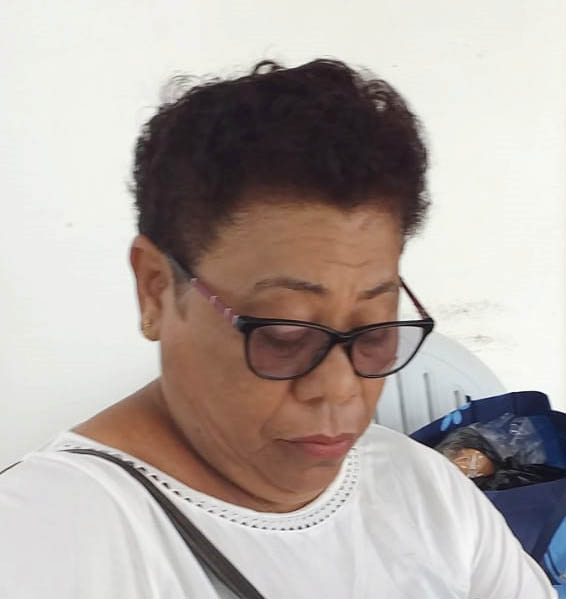Relatives of 66-year-old Janis Pritchard, who died after spending approximately 10 days in the COVID-19 Intensive Care Unit (ICU), believe that families should be provided with daily updates on patients’ condition.
Pritchard died on September 23. She was a teacher at the Mabaruma Secondary School in Region One.
According to a relative who requested anonymity, Pritchard started getting a fever and a slight cough in early September. She attributed these symptoms to the common cold but as days passed the symptoms continued to persist and eventually Pritchard was taken to the hospital and was tested for malaria and dengue. Both test results were negative.
During the time Pritchard was ill, the relative noted, she was drinking paracetamol and a lot of coconut water, so they thought this was the reason why her test results for both mosquito-borne diseases were negative.
However, a few days later it was decided that she should go to the Mabaruma Hospital and so they scheduled a visit for September 11. However, before leaving for the hospital, the relative observed that she was having difficulty breathing.
“She was not having severe symptoms while at home. It was a normal flu, so but the morning when I took her to the hospital while she was going down the stairs she had the shortness of breath but it was only then and when they did her examination at the hospital they discovered that her oxygen level was below normal. And they said that she was having symptoms suspected of COVID and they admitted her right then,” the relative said.
After she was admitted, Pritchard was swabbed and was transferred to the Georgetown Public Hospital (GPH) after the symptoms got more severe. Within 24 hours of arriving at the GPH, Pritchard was placed on a ventilator.
The relative noted that Pritchard developed severe symptoms of the disease very rapidly although she had been ill a few days before.
“After she left, we never got the chance to speak to her again and it was very challenging to get information on her condition because we can’t get on to her personally and so day in and day out we would try to call the doctors working with the COVID team and basically was the same thing they were telling us; she was stable and her SpO2 (Oxygen saturation) level was exceptional for her,” the relative said, before noting that a doctor called them once and that was two days before Pritchard died and by then it sounded like the doctors had given up hope.
When the doctor called, the relative recalled, it was only then they were told that Pritchard had developed pneumonia as a result of COVID-19 and they only called to let them know that they had completed the treatment for the pneumonia and would be taking her off the ventilator to see if she would be able to breathe on her own.
The relative then asked them about using a CT scan to determine if Pritchard was no longer infected with the pneumonia, but was told that there was only one CT scan in the hospital and they couldn’t take the risk of using the machine.
Pritchard’s relatives say that to date they still do not know if she was ever taken off the ventilator.
“It was something that was very challenging and it was the most depressing part of it but at no point no doctor was calling us to tell us anything about her condition. We had to be calling and calling and sometimes we feel like we don’t want to harass these people so that was very challenging. I don’t know whether she died when the ventilator came off but I can only try to put the pieces together but I don’t know because the morning when the doctor called I tried to figure that out with him but when doctors call you to tell you your relative die, you will be in a state of shock and disbelief and can’t question and they just dropped the bomb and that was it,” the relatives said.
In addition, the relative disclosed that not knowing what is going on with Pritchard’s condition really took a toll on them mentally and this was something that they had a hard time dealing with.
“We don’t know what goes on in the ICU. We just have to take whatever the nurses and doctors say. The doctor said that she had a heart attack and when my sister went down to find out was something else and so I want to know if they were giving my mother the attention she needed as she was in a severe condition. They say that they are going to handle her from here and mentally it was not a nice thing to experience. I think that families of the COVID-19 patients in the ICU should be provided with information on a daily basis on how the patient is progressing because we only heard from them one time and all the rest of time we had to be calling. If we know this, we don’t have to be wondering all the time what is happening,” the relative contended before adding that currently she is still trying to cope.
Relatives of Pritchard received their positive COVID-19 test result on the day of her death and as a result of isolation protocols they were not allowed to see her body after she died.










